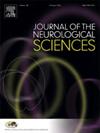Virus-specific antibody responses in multiple sclerosis patients treated with Ocrevus
IF 3.6
3区 医学
Q1 CLINICAL NEUROLOGY
引用次数: 0
Abstract
Multiple sclerosis (MS) is a demyelinating disease of the central nervous system. B cell-depleting therapy is highly efficient in treating patients with relapsing-remitting MS (RRMS), although the mechanisms behind reducing disease progression with this type of therapy is unknown. Virus infections are associated with the onset of MS and antibodies to these have previously been suggested to supplement MS diagnostics. Based on this, we aimed to investigate the effect of Ocrevus (OCR) (B cell depletion therapy) on selected virus antibody levels.
Blood samples were collected from RRMS patients before (n = 13) and during OCR treatment (n = 29) and from healthy controls (HCs) (n = 15). Serum antibodies to virus antigens from Epstein-Barr virus (EBV), severe acute respiratory syndrome coronavirus-2 (SARS-CoV-2), Rubella virus, Measles virus, John Cunningham polyomavirus, Mumps virus, Merkel cell polyomavirus, Varicella zoster virus, Influenza A virus, Human herpes virus 6, and Cytomegalovirus were analyzed by enzyme-linked immunosorbent assay.
EBV nuclear antigen 1 (EBNA1) IgG levels were elevated in RRMS patients compared to HCs independent of OCR treatment. However, no significant difference in virus antibody levels was observed following OCR treatment. Only SARS-CoV-2 spike protein IgG levels were significantly reduced following OCR treatment. The effect of OCR treatment on antibody levels may correlate with the time of infection. Only EBV EBNA1 IgG levels were significantly elevated RRMS patients at baseline compared to HCs, supporting that EBV infection is involved in the development of MS and confirming the diagnostic value of EBNA1 IgG.
Ocrevus治疗多发性硬化症患者的病毒特异性抗体反应
多发性硬化症(MS)是一种中枢神经系统脱髓鞘疾病。B细胞消耗疗法在治疗复发缓解型多发性硬化症(RRMS)患者方面非常有效,尽管这种疗法减少疾病进展的机制尚不清楚。病毒感染与多发性硬化症的发病有关,针对这些病毒的抗体曾被建议作为多发性硬化症诊断的补充。在此基础上,我们旨在研究Ocrevus (OCR) (B细胞消耗疗法)对选定病毒抗体水平的影响。采集RRMS患者在OCR治疗前(n = 13)和治疗期间(n = 29)以及健康对照(hc) (n = 15)的血液样本。采用酶联免疫吸附法检测eb病毒(EBV)、SARS-CoV-2、风疹病毒、麻疹病毒、约翰·坎宁安多瘤病毒、腮腺炎病毒、默克尔细胞多瘤病毒、水痘带状疱疹病毒、甲型流感病毒、人疱疹病毒6和巨细胞病毒抗原血清抗体。与独立于OCR治疗的hc相比,RRMS患者的EBV核抗原1 (EBNA1) IgG水平升高。然而,在OCR治疗后,病毒抗体水平没有明显差异。OCR治疗后,只有SARS-CoV-2刺突蛋白IgG水平显著降低。OCR治疗对抗体水平的影响可能与感染时间有关。与hc患者相比,RRMS患者在基线时只有EBV EBNA1 IgG水平显著升高,支持EBV感染参与MS的发展,并证实EBNA1 IgG的诊断价值。
本文章由计算机程序翻译,如有差异,请以英文原文为准。
求助全文
约1分钟内获得全文
求助全文
来源期刊

Journal of the Neurological Sciences
医学-临床神经学
CiteScore
7.60
自引率
2.30%
发文量
313
审稿时长
22 days
期刊介绍:
The Journal of the Neurological Sciences provides a medium for the prompt publication of original articles in neurology and neuroscience from around the world. JNS places special emphasis on articles that: 1) provide guidance to clinicians around the world (Best Practices, Global Neurology); 2) report cutting-edge science related to neurology (Basic and Translational Sciences); 3) educate readers about relevant and practical clinical outcomes in neurology (Outcomes Research); and 4) summarize or editorialize the current state of the literature (Reviews, Commentaries, and Editorials).
JNS accepts most types of manuscripts for consideration including original research papers, short communications, reviews, book reviews, letters to the Editor, opinions and editorials. Topics considered will be from neurology-related fields that are of interest to practicing physicians around the world. Examples include neuromuscular diseases, demyelination, atrophies, dementia, neoplasms, infections, epilepsies, disturbances of consciousness, stroke and cerebral circulation, growth and development, plasticity and intermediary metabolism.
 求助内容:
求助内容: 应助结果提醒方式:
应助结果提醒方式:


